- Home
- Jeanne DuPrau
The City of Ember: The First Book of Ember Page 9
The City of Ember: The First Book of Ember Read online
Page 9
The trick was to find a way to make the light last. If you had a light that would keep going, you could go out into the Unknown Regions and see what was there. Finding a way to explore the Unknown Regions was the only thing Doon could think of to do.
He took down a book from the “F” shelf. Fungus, it was called. He put it back. The next book was called How to Repair Furniture. He put that back, too. He went through Foot Diseases, Fun with String, Coping with Failure, and Canned Fruit Recipes before he finally found a book called All About Fire. He sat down at one of the library’s square tables to read it.
But the person who had written the book knew no more about fire than Doon. Mostly the book described the dangers of fire. A long section of it was about a building in Winifred Square that had caught fire forty years ago, and how all its doors and all its furniture had burned up and smoke had filled the air for days. Another part was about what to do if your oven caught on fire.
Doon closed the book and sighed. It was useless. He could write a better book than that. He got up and wandered restlessly around the library. Sometimes you could find useful things just by choosing randomly from the shelves. He had done this many times—just reached out and grabbed something—in the hope that by accident he might come upon the very piece of information he needed. It would be something that another person had written down without understanding its significance, just a sentence or two that would be like a flash of light in Doon’s mind, fitting together with things he already knew to make a solution to everything.
Although he’d often found something interesting in these searches, he’d never found anything important. Today was no different. He did come across a collection called Mysterious Words from the Past, which he read for a while. It was about words and phrases so old that their meanings had been forgotten. He read a few pages.
Heavens above
Indicates surprise. What “heavens” means is unclear. It might be another word for “floodlight.”
Hogwash
Means “nonsense,” though no one knows what a “hog” is or why one would wash it.
Batting a thousand
Indicates great success. This might possibly refer to killing bugs.
All in the same boat
Means “all in the same predicament.” The meaning of “boat” is unknown.
Interesting, but not useful. He put the book back on the shelf and was about to leave when the door of the library opened, and Lina Mayfleet came in.
CHAPTER 9
* * *
The Door in the Roped-Off Tunnel
Lina saw Doon immediately—he was reaching up to set a book back on its shelf. He saw her, too, when he turned around, and his dark eyebrows flew up in surprise as she hurried over to him.
“Your father told me you were here,” she said. “Doon, I found something. I want to show it to you.”
“To me? Why?”
“I think it’s important. It has to do with the Pipeworks. Will you come to my house and see it?”
“Now?” Doon asked.
Lina nodded.
Doon grabbed his old brown jacket and followed Lina out of the library and across the city to Quillium Square.
Granny’s shop was closed and dark when they arrived, and so Lina was surprised when they went upstairs and saw Evaleen Murdo sitting in her place by the window. “Your grandmother’s in her bedroom,” Mrs. Murdo said. “She didn’t feel well, so she asked me to come.”
Poppy was sitting on the floor, banging a spoon on the leg of a chair.
Lina introduced Doon, then led him into the room she shared with Poppy. He looked around, and Lina felt suddenly self-conscious, seeing her room through his eyes. It was a small room with a lot crammed into it. There were two narrow beds, a very small table that fit into a corner, and a four-legged stool to sit on. On the wall, clothes hung from hooks, and more clothes were strewn untidily on the floor. Beneath the window was a brown stain made by the bean seed in its pot on the windowsill. Lina had been watering it every night because she’d promised Clary she would, but it was still nothing but dirt, flat and unpromising.
A couple of shelves beside the window held Lina’s important possessions: the pieces of paper she’d collected for drawing, her pencils, a scarf with a silver thread woven through it. On the parts of the wall that had no hooks and no shelves, she had pinned up some of her pictures.
“What are those?” Doon asked.
“They’re from my imagination,” Lina said, feeling slightly embarrassed. “They’re pictures of . . . another city.”
“Oh. You made it up.”
“Sort of. Sometimes I dream of it.”
“I draw, too,” said Doon. “But I draw other kinds of things.”
“Like what?”
“Mostly insects,” said Doon. He told her about his collection of drawings and the worm he was currently observing.
To Lina, this sounded far less interesting than an undiscovered city, but she didn’t say so. She led Doon over to the table. “Here’s what I want to show you,” she said. She lifted the metal box. Before she could reach for the papers underneath, Doon took the box and started examining it.
“Where did this come from?” he asked.
“It was in the closet,” Lina said. She told him about Granny’s wild search and about finding the box with its lid open and Poppy with paper in her mouth. As she talked, Doon turned the box over in his hands, opened and closed its lid, and peered at the latch.
“There’s some sort of odd mechanism here,” he said. He tapped at a small metal compartment at the front of the box. “I’d like to see inside this.”
“Here’s what was in the box,” said Lina, lifting the covering paper from her patchwork of scraps. “At least, it’s what’s left of what was in there.”
Doon bent over, his hands on either side of the paper.
Lina said, “It’s called ‘Instructions for Egreston.’ Or maybe ‘Egresman.’ Someone’s name, anyhow. Maybe a mayor, or a guard. I just call it ‘The Instructions.’ I told the mayor about it—I thought maybe it was important. I wrote him a note, but he hasn’t answered. I don’t think he’s interested.”
Doon said nothing.
“You don’t have to hold your breath,” said Lina. “I glued the pieces down. Look,” she said, pointing. “This word must be Pipeworks. And this one river. And look at this one—door.”
Doon didn’t answer. His hair had fallen forward, so Lina couldn’t see the expression on his face.
“I thought at first,” Lina went on, “that it must be instructions for how to do something. How to fix the electricity, maybe. But then I thought, What if it’s instructions for going to another place?” Doon said nothing, so Lina went on. “I mean someplace that isn’t here, like another city. I think these instructions say, ‘Go down into the Pipeworks and look for a door.’ ”
Doon brushed the hair back from his face, but he didn’t straighten up. He gazed at the broken words and frowned. “Edge,” he murmured. “Small steel pan. What would that mean?”
“A frying pan?” said Lina. “But I don’t know why there’d be a frying pan in the Pipeworks.”
But Doon didn’t answer. He seemed to be talking to himself. He kept reading, moving a finger along the lines of words. “Open,” he whispered. “Follow.”
Finally he turned to look at Lina. “I think you’re right,” he said. “I think this is important.”
“Oh, I was sure you’d think so!” Lina cried. She was so relieved that her words poured out in a rush. “Because you take things seriously! You told the truth to the mayor on Assignment Day. I didn’t want to believe it, but then came the long blackout, and I knew—I knew things were as bad as you said.” She stopped, breathless. She pointed to a word on the document. “This door,” she said. “It has to be a door that leads out of Ember.”
“I don’t know,” said Doon. “Maybe. Or a door that leads to something important, even if it isn’t that.”
“But i
t must be that—what else could be important enough to lock up in a fancy box?”
“Well . . . I suppose it could be a storage room with some special tools in it or something—” A look of surprise came over his face. “Actually, I saw a door where I didn’t expect to see one—out in Tunnel 351. It was locked. I thought it was an old supply closet. I wonder if that could be it.”
“It must be!” cried Lina. Her heart sped up.
“It wasn’t anywhere near the river,” Doon said doubtfully.
“That doesn’t matter!” Lina said. “The river goes through the Pipeworks, that’s all. It’s probably something like, ‘Go down by the river, then go this way, then that way . . .’ ”
“Maybe,” said Doon.
“It must be!” Lina cried. “I know it is! It’s the door that leads out of Ember.”
“I don’t know if that makes sense,” said Doon. “A door in the Pipeworks could only lead to something underground, and how could that . . .”
Lina had no patience for Doon’s reasoning. She wanted to dance around the room, she was so excited. “We have to find out,” she said. “We have to find out right away!”
Doon looked startled. “Well, I can go and try the door again,” he said. “It was locked before, but I suppose . . .”
“I want to go, too,” said Lina.
“You want to come down into the Pipeworks?”
“Yes! Can you get me in?”
Doon thought for a moment. “I think I can. If you come just at quitting time and wait outside the door, I’ll stay out of sight until everyone has gone, and then I’ll let you in.”
“Tomorrow?”
“Okay. Tomorrow.”
Lina stopped at home the next day only long enough to change out of her messenger jacket, and then she dashed across town to the Pipeworks. Doon met her just outside the door, and she followed him inside, where he handed her a slicker and boots to put on. They descended the long stone stairway, and when they came out into the main tunnel, Lina stood still, staring at the river. “I didn’t know the river was so big,” she said, after she found her voice.
“Yes,” said Doon. “Every few years, they say, someone falls in. If you fall in, there’s no hope of fishing you out. The river swallows you and sweeps you away.”
Lina shivered. It was cold down here, a cold that she felt all the way through, cold flesh, cold blood, cold bones.
Doon led her up the path beside the water. After a while they came to an opening in the wall, and they turned into it and left the river behind. Doon led the way through winding tunnels. Their rubber boots splashed in pools of water on the floor. Lina thought how awful it would be to work down here all day, every day. It was a creepy place, a place where it seemed people didn’t belong. That black river . . . it was like something in a bad dream.
“You have to duck here,” said Doon.
They had come to a roped-off tunnel. “But there’s no light in there,” Lina said.
“No,” said Doon. “We have to feel our way. It isn’t far.” He ducked under the rope and went in, and Lina did the same. They stepped forward into the dark. Lina kept a hand against the damp wall and placed her feet carefully.
“It’s right here,” said Doon. He had stopped a few feet ahead of Lina. She came up behind him. “Put your hands out,” he said. “You’ll feel it.”
Lina felt a smooth, hard surface. There was a round metal knob, and below the knob, a keyhole. It seemed an ordinary door—not at all like the entrance to a new world. But that was what made things so exciting—nothing was ever how you expected it to be.
“Let’s try it,” she whispered.
Doon took hold of the knob and twisted. “Locked,” he said.
“Is there a pan anywhere?”
“A pan?”
“The instructions said ‘small steel pan.’ Maybe that would have the key in it.”
They felt around, but there was nothing—just the rocky walls. They patted the walls, they put their ears to the door, they jiggled the knob and pulled it and pushed it. Finally, Doon said, “Well, we can’t get in. I guess we’d better go.”
And that was when they heard the noise. It was a scuffling, scraping noise that seemed to be coming from somewhere nearby. Lina stopped breathing. She clutched Doon’s arm.
“Quick,” Doon whispered. He made his way back toward the lighted tunnel, with Lina following. They ducked under the rope and rounded a turn, then stopped, stood still, and listened. A harsh scraping sound. A thud. A pause . . . and then the sound of an impact, a short, explosive breath, and a muttered word in a gruff, low voice.
Then slow footsteps, getting closer.
They flattened themselves against the wall and stood motionless. The footsteps stopped briefly, and there was another grunt. Then the steps continued, but seemed to be fading. In a moment, from a distance, there was another sound: the chink of a key turning in a lock, and the click of a latch opening.
Lina made an astonished face at Doon. Someone had gone down the roped tunnel and opened the door! She put her mouth close to Doon’s ear. “Shall we try to see who it is?” she whispered.
Doon shook his head. “I don’t think we should,” he said. “We should go.”
“We could just peek around the corner.”
It was too tempting not to try. They crept forward to the place where the tunnel turned. From there they could see the entrance to the roped tunnel. Holding their breath, they watched.
And in a minute, they heard a thump and click—the door closing, the lock turning—and footsteps once again, this time quick. A long leg stepped over the rope, and the person it belonged to turned and walked away. All they saw was his back—a dark coat, dark untidy hair. He walked with a lurching motion that struck Lina as somehow familiar. In a few seconds, he had vanished into the shadows.
When they came up out of the Pipeworks, they stripped off their boots and slickers and hurried out into Plummer Square, where they flopped down on a bench and burst into furious talk.
“Someone got there before us!” said Lina.
Doon said, “He was walking slowly when he went in—as if he was looking for something. And he walked fast when he came out . . .”
“As if he’d found something! What was it? I can’t stand not to know!”
Doon jumped up. He paced back and forth in front of the bench.
“But how did he get the key?” he asked. “Did he find Instructions like the ones you found? And how did he get into the Pipeworks? I don’t think he works there.”
“There’s something familiar about the way he walks,” said Lina. “But I don’t know why.”
“Well, anyhow, he opened that door and we can’t,” said Doon. “If it does go somewhere, if it does lead out of Ember, he’ll be telling the whole city pretty soon. He’ll be a hero.” Doon sat down again. “If he’s found the way out, we’ll be glad, of course,” he said glumly. “It doesn’t matter who finds it, as long as it helps the city.”
“That’s right,” Lina said.
“It’s just that I thought we were going to find it,” said Doon.
“Yes,” Lina said, thinking how grand it would have been to stand before all of Ember, announcing their discovery.
They sat without talking for a while, lost in their own thoughts. A man pulling a cart full of wood scraps went by. A woman leaned from a lighted window on Gappery Street and called out to some boys playing in the square below. A couple of guards, in their red and brown uniforms, ambled across the square, laughing. The town clock rang out six deep booms that Lina could feel, like shudders, beneath her ribs.
Doon said, “I guess what we do now is wait to see if there’s an announcement.”
“I guess so,” said Lina.
“Maybe that door is nothing special after all,” said Doon. “Maybe it’s just an old unused supply closet.”
But Lina wasn’t ready to believe that. Maybe it wasn’t the door out of Ember, but it was a mystery nevertheless—a mystery connect
ed, she was sure, to the bigger mystery they were trying to solve.
CHAPTER 10
* * *
Blue Sky and Goodbye
Lina slept restlessly that night. She had frightening dreams in which something dangerous was lurking in the darkness. When the lights went on in the morning and she opened her eyes, her first thought was of the door in the Pipeworks—and then right away she felt a thud of disappointment, because the door was locked and someone else, not her, knew what was behind it.
She went in to wake Granny. “Time to get up,” she said, but Granny didn’t answer. She was lying with her mouth half open and breathing in a strange hoarse way. “Don’t feel too good,” she finally said in a weak voice.
Lina felt Granny’s forehead. It was hot. Her hands were very cold. She ran for Mrs. Murdo and after that to Cloving Square to tell Captain Fleery she would not be coming to work today. Then she ran to Oliver Street, to the office of Dr. Tower, where she banged on the door until the doctor opened it.
Dr. Tower was a thin woman with uncombed hair and shadows under her eyes. When she saw Lina, she seemed to grow even more tired.
“Dr. Tower,” Lina said, “my grandmother is sick. Will you come?”
“I will,” she said. “But I can’t promise to help her. I’m low on medicine.”
“But come and look. Maybe she doesn’t need medicine.”
Lina led the doctor the few blocks to her house. When she saw Granny, the doctor sighed. “How are you, Granny Mayfleet?” she asked.
Granny looked at the doctor blearily. “I think ill,” she said.
Dr. Tower laid a hand across her forehead. She asked her to stick out her tongue, and she listened to her heart and her breathing.
“She has a fever,” the doctor told Lina. “You’ll need to stay home with her today. Make her some soup. Give her water to drink. Put rags in cool water and lay them across her forehead.” She picked up Granny’s bony hand in her rough, reddish one. “What’s best for you is to sleep today,” she said. “Your good granddaughter will take care of you.”

 The Prophet of Yonwood
The Prophet of Yonwood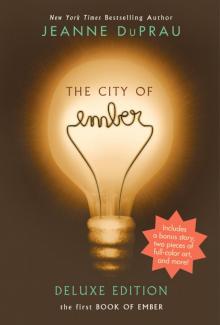 The City of Ember
The City of Ember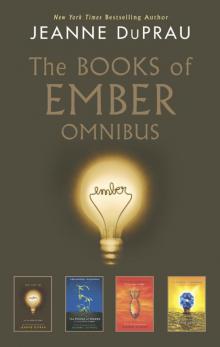 The Books of Ember Omnibus
The Books of Ember Omnibus The Diamond of Darkhold
The Diamond of Darkhold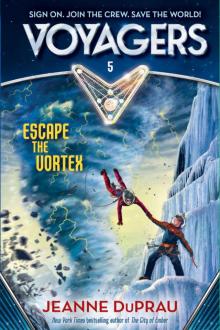 Voyagers: Escape the Vortex (Book 5)
Voyagers: Escape the Vortex (Book 5)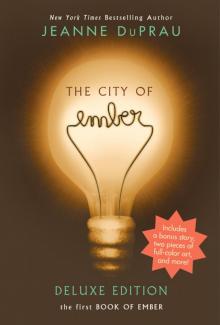 The City of Ember Deluxe Edition
The City of Ember Deluxe Edition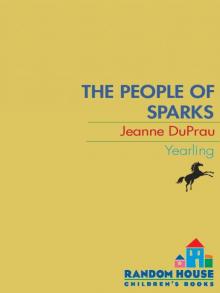 The People of Sparks: The Second Book of Ember (Books of Ember)
The People of Sparks: The Second Book of Ember (Books of Ember)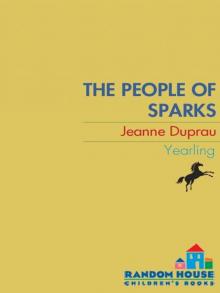 The People of Sparks
The People of Sparks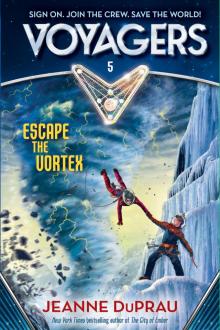 Escape the Vortex
Escape the Vortex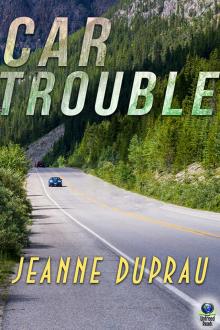 Car Trouble
Car Trouble The City of Ember: The First Book of Ember
The City of Ember: The First Book of Ember